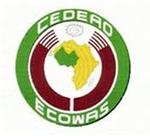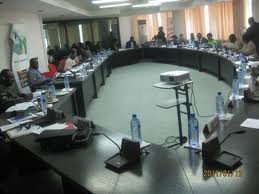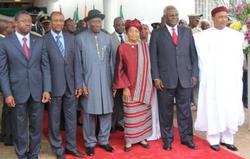ECOWAS CONTRACTS OF THE REPUBLIC OF GHANA
THE COMMISSION
The mission of ECOWAS is to promote co-operation and development in all spheres of economic activity through the removal of all forms of trade barriers and obstacles to the free movement of persons, goods and services, as well as the harmonising of regional sector policies. The main objective is to establish a large West African common market and create a monetary union.
ECONOMIC BACKGROUND
ECOWAS Member States occupy a surface area of 1.5 million km2, representing 17% of the total surface area of the continent. The countries with the largest land mass are Niger (24.8%) and Mali (24.3%) whilst the country with the smallest is Cabo Verde (0.1%). The population of West Africa which grows at an annual rate of 2.67% was estimated at 261.13 million in 2006. Nigeria is the most populous country in the regions with a population of 134.38 million (51.5 % of the region's total population). It is followed by Ghana which has an estimated population of 22.56 million, representing 8.6% of the total population of the region. Cabo Verde is the Member Country with the smallest population estimated at 520 000 or 0.2% of the region's total.
ECOWAS is the most populous regional economic community in Africa . A distinct economic sub group known as UEMOA also exists within the community. This sub group which comprises eight countries is a monetary and customs union with a common currency, the CFA franc. The countries are Benin , Burkina Faso , Cote d'Ivoire , Guinea Bissau, Mali, Niger , Senegal and Togo . The seven remaining countries in ECOWAS have each their own national currencies. This group accounts for 75% of the region's GDP and 70% of its population.
Of this seven, five of them namely, Gambia , Ghana , Guinea , Nigeria and Sierra Leone are actively preparing to establish a second common currency (West African Monetary Zone, WAMZ) in December 2009 within the framework of the ECOWAS monetary cooperation programme. On the basis of the performance of the countries relative to the ECOWAS macro economic convergence criteria, the two monetary zones are expected to merge after 2009 to form a single currency. However, a new impetus has been added to this monetary project with the recent directive by the ECOWAS Authority of Heads of State and Government that the ECOWAS Commission in consultation with the Ministers of Finance and the Governors of Central Banks of Member States should fast-track the common currency project with a view to attaining a single currency in 2009.
Real GDP growth rate in the ECOWAS region was 5.7 in 2006 as against 6% in 2005. This decline was due to the increase in the oil bill and the persistent socio-political crises some Member countries are experiencing. All the countries of the region recorded varying levels of growth : 4.0% for Cote d'Ivoire , Guinea , Guinea Bissau, Niger, Senegal and Togo and above 5% for Burkina Faso , Cape Verde , The Gambia, Ghana , Liberia , Nigeria and Sierra Leone .
The external debt burden of the region declined from 40.0% of GDP in 2005 to 30.9% of GDP in 2006, thanks to sound macroeconomic management by the countries and the measures taken by the international community to reduce the debt burden of some Member countries.
About 60% of the GDP was derived from the economic activities of the region namely, agriculture in the primary sector (24.2%), mines and quarries in the secondary sector (19.3%) and trade in the tertiary sector (15.7%).
With respect to the primary sector, agriculture accounts for 79%. Some of the cash crops cultivated in the region such as coffee; cocoa, and cotton fetch substantial foreign exchange to Member States. However, the prices of such cash crops fluctuate in an unpredictable manner as the countries have no say in the fixing of the prices. The main cash crops cultivated in the ECOWAS region are coffee, cocoa ( Cote d'Ivoire , Ghana , Nigeria and Togo ) and cotton ( Benin , Burkina Faso ).
In the secondary sector, mines and quarries account for 61% of all activities in the region. However its importance varies from one Member State to another. In Nigeria crude oil production accounts for 84% of its secondary economic activity, whilst mining in Liberia represents 53% of secondary economic activity. The reason for the average performance of Liberia can be traced to the embargo placed by the United Nations on diamond and other products from Liberia . In ECOWAS countries the main products of the extractive industries are crude oil ( Nigeria , Cote d'Ivoire ), diamond ( Guinea , Liberia and Sierra Leone ) and gold ( Burkina Faso , Ghana , Guinea , Mali , Niger ).
With respect to the tertiary sector, though trade is the most dominant activity, it represents only 42% of the contribution of the sector. Also, the volume of intra regional trade is low. In 2004 it accounted for about 11% of the total trade of the region. The figures confirm the assumption according to which the informal sector of the region is dynamic and robust given that it accounts for a significant proportion of the unofficial trade of the region.
The economic growth of the region is still below the minimum 7% required to attain the Millennium Development Goals. However, the forecasts indicate that growth is expected to be better in 2007. Exports are expected to increase, despite the expected rise in oil prices and inflation is expected to drop. The outstanding foreign debt is expected to drop significantly, following the implementation of the decisions taken by the G8 in Gleneagles.
Copyright (C) 2009 Ecowas Contract Of The Republic Of Ghana


